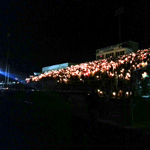 Athletes develop a mental toughness through the rigors of competition, whether the elevation of a win or the despair from a loss. However, the mental game of basketball sometimes plays a secondary role for toughness when an athlete is faced with the death of a friend or loved one.
Athletes develop a mental toughness through the rigors of competition, whether the elevation of a win or the despair from a loss. However, the mental game of basketball sometimes plays a secondary role for toughness when an athlete is faced with the death of a friend or loved one.
Life if often much more cruel than any adversary faced on the court, but the lessons learned through the grief process are crucial to complete emotional healing and to restore your mental game in basketball. There are five stages throughout the grief process, although any individual may experience them in a different order than listed. The most important aspect of dealing with grief, and eventually restoring mental toughness is that the athlete acknowledge the process and seek the help of a trusted individual or professional while traversing the myriad of emotions associated with grief.
Silently suffering alone only prolongs the process with more negative side effects along the way and delayed recovery.
These five stages vary in sequence and duration with each individual. However all must be traversed in order for complete emotional healing to occur.
The first of these stages is Denial. This is a feeling of numbness, and an inability to believe the person is actually gone. It may be witnessed when the grieving team lack focus, don’t perform well in practice, or an individual who rejects any conversation referring to the deceased in past tense. It is defense mechanism to remove the shock from the situation. A person in denial often shows little emotion, because in their mind the person is not truly gone. While outwardly this may look like “silent strength”, the reality is the person is not even beginning to emotionally deal with the loss; therefore their performance may be on either extreme either good or bad.
Once the individual acknowledges the passing of the loved one or friend, the next stage is Anger. This includes reproach for how unfair a situation is, fury over lost experiences or conversations left unsaid. This anger can also manifest towards the deceased for leaving, no matter how irrational the accusation may be. It is important to recognize this anger so that it doesn’t cloud the entire thought process into a negative mindset. Despite the difficulty, it is crucial to vent the anger to a close friend or professional so that these feelings do not fester and create longer, more serious issues within the individual psyche. During this phase it will be difficult for the athlete to reach peak performance.
Another stage in the grief process is Bargaining. In many instances of terminal illness, the bargaining occurs before the death. These are often made with God to stop or change a prognosis. Praying, begging, and offering any exchange in return for not losing the friend or family member is common. Even after the individual passes, spending a large amount of time wishing and daydreaming for the deceased’s return is a form of bargaining. The athlete’s mental game is questionable during this stage. In most cases the performance is inconsistent.
Depression is the overwhelming stage when emotions crash down around the individual invading their entire thought processes. It feels as the lowest point with absolute loss of hope surrounded by an engulfing darkness. This time feels significant loss of control, and often is accompanied by suicidal thoughts, which makes it even more imperative to seek help during the process. Attempting to deal with the onslaught of emotions alone does not signify strength, but rather ignores the dangers of grief. Most athletes during this stage do not perform well. Their mental game is totally off and they will not feel like practicing, hence the game time performance will be poor.
The last stage associated with the healing process of grief is Acceptance. This is not merely giving up, but rather changes in focus from the loss of the past to the promise of future living. The individual is able to acknowledge the loss, and pain associated with that loss, but focus energy on positive thoughts of the deceased, or finding a purposeful method to memorialize them. When the athlete complete this stage they are able to get their mental game for basketball back on track. They may even focus more on being mentally tough for their loved one or friend.
Any time an athlete experiences death of a loved one or friend; it rattles their mental toughness both on and off the court. The process of grief is not to be taken lightly, nor navigated alone. A school counselor, coach or trusted individual is critical to the healing process for any teenager experiencing the death of someone close to them.
It is not an easy process, and often contains many emotional setbacks. However, it is a process to overcome the negativity associated with the loss of someone close, in the process work as hard as you can to restore a positive focus towards the memories of your friend, the future and reaching peak performance.
To My Basketball Family at Parkwood
Stay strong and find comfort in knowing your friend is now at peace and in a better place.
RIP – HS
